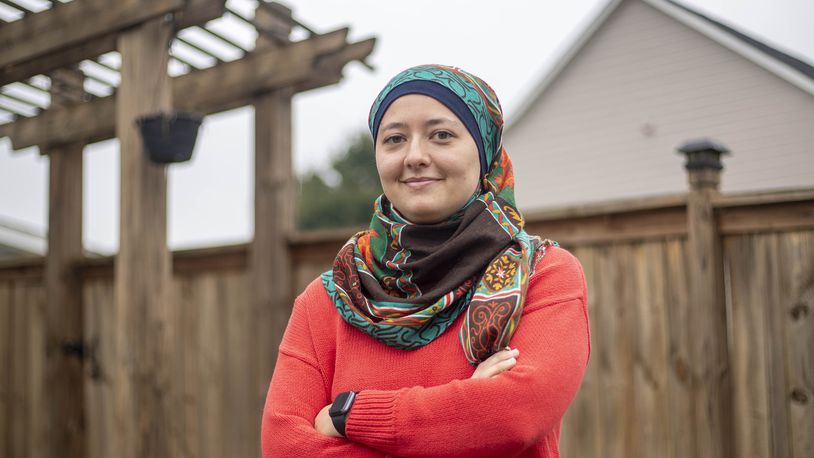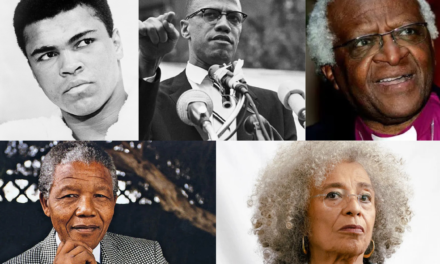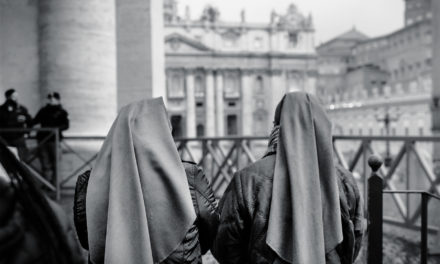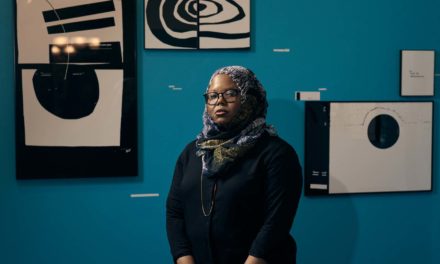10/04/2021 — Duluth, Georgia — Ruwsidering running for a political position in Georgia. (Alyssa Pointer/ Alyssa.Pointer@ajc.com)
Ruwa Romman is entertaining the idea of running for office.
The 28-year-old from Duluth envisions herself running on a platform focused on health care, education, social justice and the economy. She also wants to shatter stereotypes and challenge barriers placed on Muslim women.
“The stereotype is that Muslim women don’t vote. They do,” Romman said. “I got politically engaged outside of my Muslim identity, but then I quickly realized my Muslim identity was a necessity to bring with me in this journey.”
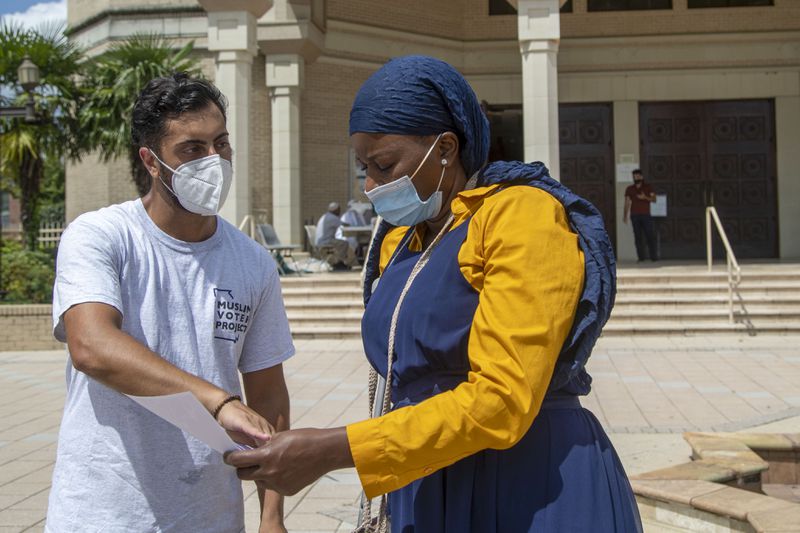
08/27/2021 — Atlanta, Georgia — Georgia Muslim Voter Project Community Organizer Salik Sohani, left, speaks with Madina Mugisa about voter registration following prayer outside of the Al-Farooq Masjid in downtown Atlanta, Friday, August 27, 2021. August 27 is National Muslim Voter Registration Day. (Alyssa Pointer/Atlanta Journal Constitution)
Romman said when candidates approach Muslim women, the conversation tends to center on foreign policy and counterterrorism, and not domestic topics they care about.
Azka Mahmood, the deputy director for the Council on American-Islamic Relations (CAIR) Georgia, agrees.
“For American Muslims, and specifically for Muslim women, their voices are not included in policy matters,” Mahmood said. “It is critical their voices are heard in the halls of power where decisions are made.”
OUT OF THE SHADOWS
CAIR, along with the voting rights groups Vote Run Lead and the Georgia Muslim Voter Project, are working to boost the number of Muslims who are registered to vote in the state and encourage Muslim women to seek office.
The three organizations held a virtual seminar over the summer to encourage civic engagement, which was attended by dozens of Muslim women. U.S. Rep. Ilhan Omar delivered a recorded address, and Fulton County Commissioner Khadijah Abdur-Rahman spoke about her political journey.
“It was exciting,” said Shafina Khabani, the executive director of the Georgia Muslim Voter Project. “Women have this unspoken sisterhood and bond. To see other women empowered and excited, it motivates me because this work can be really hard.”
Khabani believes “elevating the voices of Muslims across Georgia” will help encourage women to be politically active.
“Muslim women are the hearts and souls of our communities,” Khabani said.
Although the U.S. census does not collect data based on religious affiliation, the Pew Research Center estimates that about 3.45 million Muslims are living in the country.
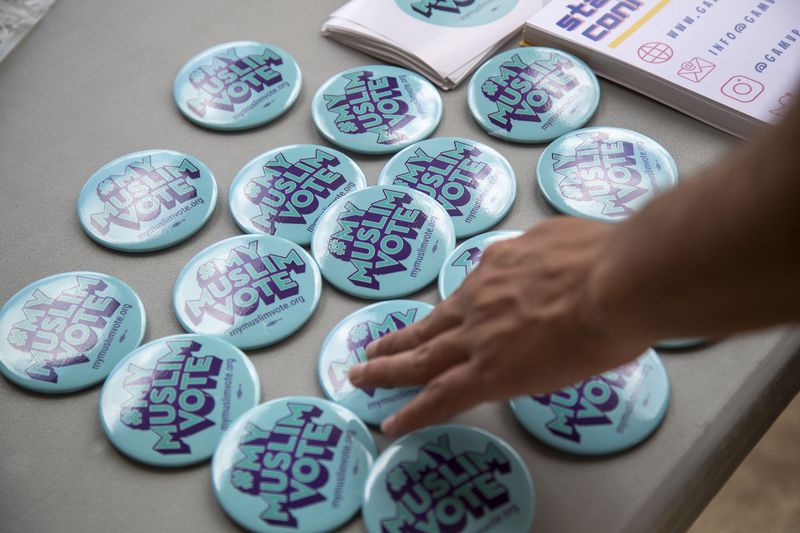
08/27/2021 — Atlanta, Georgia — My Muslim Voter pins are displayed at the Georgia Muslim Voter Project table outside of the Al-Farooq Masjid in downtown Atlanta, Friday, August 27, 2021. (Alyssa Pointer/Atlanta Journal Constitution)
A 2020 poll conducted by the Institute for Social Policy and Understanding shows about 78% of Muslims are registered to vote, compared with about 92% of Catholics, 91% of white Evangelicals, 90% of Jews and 88% of Protestants.
“There has been a push to get out voters across every kind of minority community, especially in a state like Georgia, where the margins for winners are so razor thin and every voter counts,” Mahmood said.
For Romman, being a part of the changing face of Georgia is important.
As a Palestinian-American who immigrated to the U.S. about a month before 9/11, she still remembers the fears some Muslims felt when it came to being politically active. At the time, many in the Muslim community wanted to keep a low profile to avoid discrimination.
“I remember in high school I had a teacher who pulled me out of class because he overheard I’m Palestinian,” she said. “He sat there and questioned me to make sure I wasn’t part of Hamas or any other terrorist group.”
Since then, Romman has become increasingly interested in politics and making her presence known in political spaces.
“If you would have told me in 2016 that we would be having summits and trainings especially geared for Muslim women to run, I would have a hard time with it because even though people were voting, there was still this sense of fear,” she said
MAKING HISTORY
Abdur-Rahman, who took office in January as the Fulton County commissioner for District 6, is the first Muslim woman to win an elected position in Georgia.
While Abdur-Rahman wants others to follow in her footsteps and encourages Muslim women to become civically engaged, she also acknowledges how fears of Islamophobia and racism could deter some people from seeking their political dreams.
“I’ve heard that women shouldn’t run, I’ve heard that it’s not safe for Muslim women to be in those spaces, and that’s even more of a reason why we should be running,” she said. “I think what needs to happen is more Muslims need to come forward and be out in the public.”
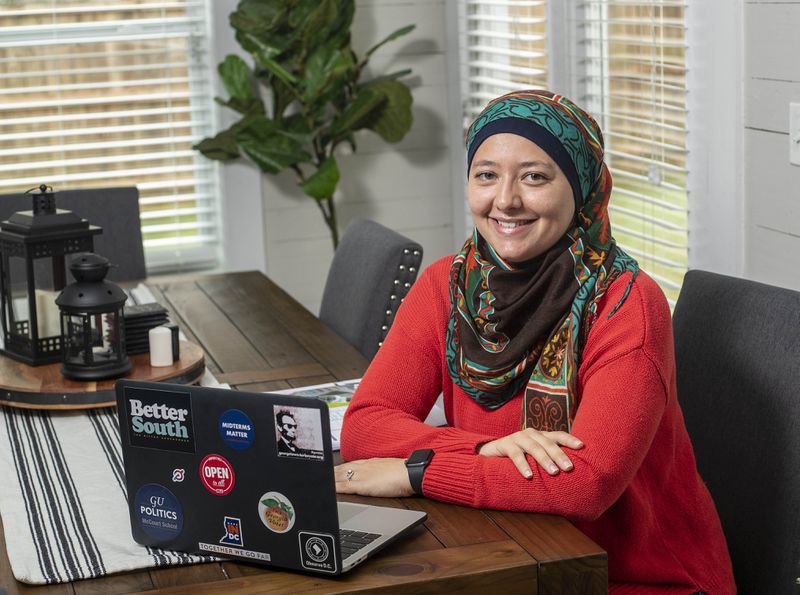
10/04/2021 — Duluth, Georgia — Ruwa Romman, 28, sits for a portrait at her residence in Duluth, Monday, October 4, 2021. Ruwa is considering running for a political position in Georgia. (Alyssa Pointer/ Alyssa.Pointer@ajc.com)
Abdur-Rahman said she believes “all voices need a seat at the table.”
“As a Muslim woman myself, one of the biggest jobs that I have was to break up a lot of misconceptions when it comes to women of Islamic faith,” she said. “What better way to serve as a catalyst, to know that we have way more in common than we have differences, than to be in political office.”
As a naturalized citizen from Jordan, Noor Abbady recalls the excitement she felt when she gained voting rights about six years ago. She then realized that her “participation in the election process cannot stop at voting.” She then started to work on campaigns for candidates who shared similar values as her.
“I think of Muslim women just like any other underrepresented group. Usually they are either overlooked or participating very passively in the most democratic process that we have, and that is elections and voting,” Abbady said.
As a member of Roswell Community Masjid, she has also worked to foster bonds between candidates and the Muslim community by inviting them to speak at the house of worship.
“I feel the presence of more people from underrepresented communities adds to value of our democracy as a whole,” Abbady said. “I feel there is some kind of collective yearning for representations that are robust and meaningful in our democracy.”
When it comes to her own possible run for office, Romman said her goal is to never lose sight of her “why.”
“I never want to be the reason that someone stops being civically engaged,” she said. “I want to be the reason someone goes ‘Hey, me taking the time to vote is worth it because government works for people like me.’”
